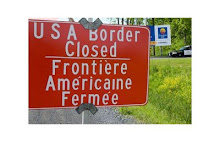I agree with your take on "walk-in" purchases, especially when they are allowed two cartons at a time. The PACT Act does not regulate walk-in purchases. The PACT Act does regulate state to state commerce. The US "Postal Service is required by law to provide delivery service to the American public when mailable matter is properly presented." The mail-order/internet sales are not "walk-in" purchases, purchased made on our territory. Although the operator may be Seneca, and their operation is in Seneca Nation, their mailable matter is not properly presented as such. The operators utilize NY addresses and, possibly, NY/USA based servers to host their site and transactions. (States have been making strides towards recover internet gambling revenue based on the location of the user or server) Besides the advertised Seneca-branding, operators are representing themselves as domestic NY operations shipping to another state. Even under these circumstances i would agree with your take that it's allowed, since, the US postal service is not required to inspect the packages, other foreign countries can do it, and the importers are required to reporting their imports(over two cartons) to the state. I agree that the responsibility is on the consumer, which is why our businesses have to stop crying foul, racism, discrimination, everytime their exploitive models are questioned. Claiming sovereignty than operating as just another domestic business of NY harms legitimately sovereign businesses. Exporters should respect foreign nations policies.
November 13, 2009 11:30 AM
Ohnkwe Ohnwe said...
It is not that consumers are only allowed to purchase two cartons, it is that up to two cartons are exempt from the state use tax (in New York). Whether a purchase is of the "walk-in" variety or a remote or non face-to-face purchase, the point of purchase is still at our retail establishments. Although the definition of "point of purchase" has been batted around, the generally accepted definition is the place where either the funds are collected for the transaction or where the data for payment is collected. It isn't an issue of the use of the mail or internet or phone. It is where the data is physically being collected. Call centers that are not on our land probably cross a defensible line, but server location or definition of cyberspace are irrelevant.
November 13, 2009 12:27 PM













![-[]-[]-/\-[]-[]-](https://blogger.googleusercontent.com/img/b/R29vZ2xl/AVvXsEjLoXmKO8PJVQ5pZ2q7GX7nFKw8H2tb28dxt-o10FUBNtOGszWhWoLB7tgjtMgtISpuSxNW3fcDxfuSS2DqojsdjNJ1lVggyUS374PnzsDbOhk4ukvtTunFQcyfkckZeBzcLbri4LDYN_E/s214/29-03-A-voice-from-the-Akw-.jpg)





2 comments:
Since you state that, "it is disapointing that someone who claims to be Native, is so against our own people," why continue playing the race card against your own people? Since we are of the same people, who is it that i claim to be "so against" ? The "open resentment to Native businesses" that i express is not towards the ambiguous Natives as a whole as you try to frame it, rather, towards those who are exploiting our communities from the inside and out.
The generally accepted definition of point of purchase that you accept( "where either the funds are collected ... or where the data for payment is collected" ) would make remote or non face-to-face purchases that utilize infrastructures that are not on our land, outside our sovereignty.
Your further points on the PACT Act: the Act, "is designed to shut down ... Native retailers," and it "is designed to disproportionately effect native business," are misleading. Consumers will still be allowed to purchase products from native retailers that are "exempt from the state use tax(in New York)", so long as their imports are within their states limits. Native businesses who disproportionately rely on sales that are over states acceptable amount of tax-free purchases will be required to export to registered importers.
The PACT Act addresses those businesses that represent themselves as domestic businesses -- which would require our native businesses to officially represent themselves as foreign or domestic. The status of the operator is irrelevant to the official representation of the business. Claiming that the Act is some race based attack, when it is clearly an act of market protection, would mislead public dissent. If states denied their importers the right to purchase from Native retailers you might be on to something.
Since the aspect of operating between our Native markets and the US markets is what you are promoting in your "Misguided" post, i'll continue that subject of, "operators representing themselves as domestic NY operations," there.
Prideborne - I was not suggesting that you resent all Natives and I think you and I are clear about the segment of Native businessmen that you loathe. I don't believe defending Native people, businesses or sovereignty as a birthright is playing the race card. If the only distinction you believe Native people have is our race then you will never quite get the reason for defending ourselves.
On the point of purchase(POP) issue; utilizing infrastructure that does not lie in our communities does not determine the POP. I agree that if the place that the information is collected or entered into a system is not on our land then the activity is at risk.
The line in my post was, "The PACT Act clearly is designed to shut down consumers from using the USPS to deliver products purchased from Native retailers". After seeing how you reprinted the line who is being misleading? There is nothing misleading about what I said including the part about the act disproportionately effecting Native businesses. There is no debate that the PACT Act is about mailing tobacco. I agree it does not specifically address walk-in purchases, but it will have an effect on those enterprises as well.
I'm unclear on your comments regarding retailers representing themselves as domestic NY operations. Any state or federal requirement for Native individuals or entities to be declared foreign, domestic or otherwise is BS. It is like the Enhanced Tribal Cards(ETC's). One of the requirements for DHS compliance is that the cards include a declaration of citizenship; US or Canadian. There is no need for our people or our businesses to be considered anything other than Seneca, Mohawk or what ever nation we are a part of.
Post a Comment